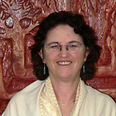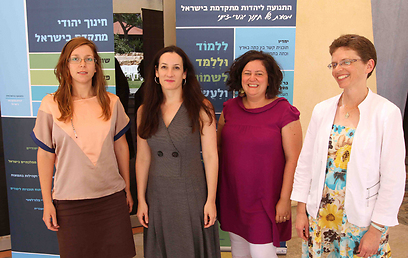
'Female rabbis slowly gaining recognition'
Reform movement's female rabbis are celebrating ruling that will offer them state funding but for them bigger victory is greater understanding, recognition of their role in community
Israel's reform movement numbers 37 integrated congregations and though it has been 25 years since the first Israeli female rabbi was ordained, the image of a woman in a talit (prayer shawl), standing in front of a congregation touching the torah will still draw looks of courteous surprise or even sweeping objection from completely secular people.
Last month these women were front page news for their significant victory in the battle for rabbinical equality with orthodox rabbis over state funding.
Miri Gold, the Kibbutz Gezer regional community rabbi led the struggle with a petition to the High Court, and she and her colleagues won: The State will finance them as it does with orthodox rabbis, but not through the Ministry of Religion, rather the funding will come from the Culture Ministry purse.

Female rabbis: Finally receiving recognition (Photo: Ido Erez)
"It was enough for my daughter to boast about her mother on Facebook," she said, "slowly, slowly we are seeing some shift in (peoples') attitude towards us: Years ago, when my daughter was in the army, she just didn't tell people what her mother does. It was too complicated and too loaded (an issue)."
At the age of 44, with three children and massive support from her spouse, Gold began her studies at the Hebrew Union College in Jerusalem and within four years she also completed a master's degree in Judaic studies.
Jewish identity
"It was very obvious to me that I was going back to Gezer. We asked the reform movement to recognize us as a regional community, because not everyone in Gezer belongs to the reform movement and who am I to force anyone in the kibbutz to accept a view or religious determination."
Asked how she dealt with repeated claims from orthodox Jewry that state that reform Jews are supplying justification and an easy route for Jewish assimilation she said: "I believe that at the foundation of this claim is are two very disturbing things.
"One is the inability to recognize a person's choice, even if he is Jewish, on how he chooses to live his life. Orthodoxy cannot force people to live a life of substance and it often doesn't even try to.
"The other thing that bothers me is the ignorance. Orthodox Jewry is unaware of the fact that in the past few decades there is a gradual rise in the interest displayed by the younger generation in America in its Jewish identity, Israel and Hebrew studies.
"The State of Israel can offer some kind of Zionist response but as for the issue of Jewish identity, it is very clear that these people will not live as orthodox (Jews). That is precisely why the reform movement can act as a dam against assimilation for these people who want a Jewish life but also believe that a person has freedom of choice and the right to an equalitarian life."
They all went through four years of demanding academic studies and two more years as apprentices to veteran rabbis. After that, there is no end to Jewish creativity and the many different characters of the congregations, the problems they need to deal with and the understanding that investing in the future generation is critical.
Shallowness of secularism
As for the strange situation where most secular Israelis still see themselves as orthodox Jews, Gold notes: "More and more schools are struggling with the question of the Jewish identity they give their students…we present a response that secular schools can offer their students without sounding foreign, limiting or discriminative.
Mira Horev believes that even within orthodox Jewry there is a discernable slow, tectonic move towards understanding.
All the female rabbis are concerned with the shallowness of the concept of secularism and its lack of content. They all want to make the world a better place ('Tikun Olam') and yes, are proud of their latest achievement though "there shouldn't be such massive support or any support from the state for religious institutions to begin with.
"But if it does support (religious institutions), it should do so according to the principle of equality. The victory in the High Court was a victory of that principle and not specifically of conservative or reform (Jews)," Horev stressed.
"10 years from today when there are 80 congregations and many many more female rabbis – there are only 32 of us now – I expect people to say female rabbi without the phrase sounding foreign and strange and without hate.
"I'd like people to experience their Jewishness as a celebration of differences and diversity and when they speak of 'the other' let them do it out of curiosity, interest and joy," says Miri Gold as she looks to the future.










